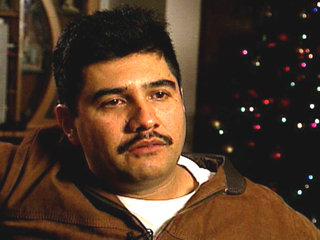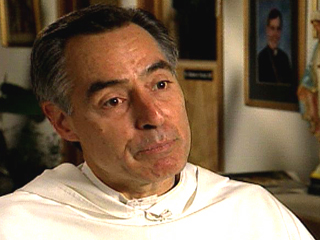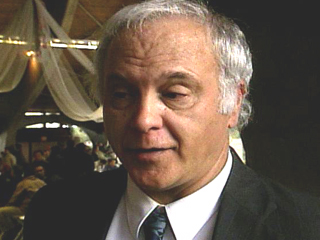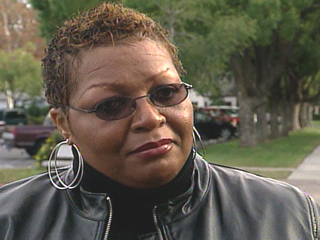In This Episode << SLIDE LEFT TO SEE ADDITIONAL SEGMENTS
Churches and the Foreclosure Crisis
KIM LAWTON: It’s a longstanding Mexican-American Christmas tradition called Las Posadas. In a procession, parishioners reenact Joseph and Mary’s search for lodging in Bethlehem. They knock, but they’re told there’s no room in the inn. Here in Antioch, California, an epicenter of the foreclosure crisis, church leaders say the story of Las Posadas was especially poignant this year.
Reverend ROBERTO CORRAL (Holy Rosary Catholic Church): You feel the sense of rejection that is very real for people nowadays losing their home, not finding the shelter that they want, not finding the acceptance, feeling rejected by human beings or by God, by the institutions or whatever.
LAWTON: Raul de Anda and his wife Lorena can relate all too well. Lorena is nine months pregnant, and the family has been fighting an uphill battle to avoid foreclosure. They bought their house in 2003 with an adjustable rate mortgage. Then the economy started going bad. The de Andas have a mortgage of nearly $400,000 and have spent thousands more fixing the place up. But the house is now worth only $180,000. Raul’s hours at his construction job were cut back and, at the same time, the bank kept raising the interest rate on the mortgage. The rate went over 11 percent, and they couldn’t keep up.
RAUL DE ANDA: In the month of May of this year, where we see, okay, we are $300 short to make the house payment, and the fridge is empty. I don’t want that to happen to any family in this country.
LAWTON: But it is happening to millions of families. California has one of the hardest hit housing markets in the country, with an average of one out of roughly every 200 homes being foreclosed. The situation has been especially tough in the outer suburbs of San Francisco, such as Antioch and nearby Stockton, which has been dubbed the nation’s foreclosure capital. In the midst of it all, faith-based groups are taking a lead role in trying to find solutions.
TOM AMATO: (Director, People and Congregations Together, PACT): We think it’s important that the faith community really create a vision for this society where there’s a focus on the common good, and so many families are being hurt by this, and families are really key, of all types, to our society.
LAWTON: Tom Amato is director of PACT, People and Congregations Together, an interfaith group in San Joaquin County. PACT and the Homeowners Taskforce co-sponsored a Foreclosure Fair at a local United Methodist church.
COUNSELOR: Did your mortgage payments go up?
LAWTON: Troubled homeowners met with housing counselors and got advice about their particular situation. They heard about programs that might help them, and some consulted with bank representatives about the possibility of modifying their loans. Hundreds came, from many ethnic and economic backgrounds, showing the magnitude of the crisis.
ARLONDA PIRTLE (PACT): We’re all suffering from the top to the very bottom. We’re talking about regular people — doctors, lawyers, police officers. We’re all impacted. It does not discriminate. It’s not prejudiced. It’s everywhere.
LAWTON: Arlonda Pirtle is on the PACT housing committee. She is frustrated by the perception that all troubled homeowners are reaping the consequences of irresponsible loan decisions. In fact, she says, many were unlucky victims of falling home values, while others were simply taking advantage of legal loan programs promoted and approved by the banks.
Ms. PIRTLE: They want to blame us as homeowners for that, but they offered it. We took advantage of it, so now they want to blame everything on us. It’s both-sided, not just the homeowners. The bank needs to take the hits for those as well.
LAWTON: Some of the volunteers face foreclosure themselves. Ana Reynoso is a real estate agent whose business collapsed after the housing bubble burst. Her home has plummeted in value. She can’t sell it and says she may lose it any day now. Ana and others in the faith network say while helping individual homeowners is important, the most effective solutions will only come through systemic changes, and those, they believe, will only happen through a massive grassroots effort.
ANA REYNOSO: We have to get together. We have to come together to make something happen because it’s just not right. A lot of communities are getting broken up.
LAWTON: Raul de Anda is also part of that grassroots coalition. When he got into mortgage trouble, he sought help from his local Catholic parish.
Mr. DE ANDA: The church is really important, because they give us all the moral support that we need. They say you are not alone.
Rev. CORRAL: I think the church has in many ways been a mediating institution in the United States culturally, one of those institutions that helps people come together in good times and in bad times, and so certainly people feel a certain confidence, certain openness from the church to help when times are not so good.
LAWTON: The church put de Anda in touch with activists who helped him push the bank for a loan modification. Now he’s helping rally people in the policy battle on the local and national level.

Raul De Anda |
Mr. DE ANDA: Every working man, working family, has to have a home, but has to have a home where they can afford to pay on their salary.
ACTIVIST (at rally): God is going to send us a miracle.
LAWTON: The national network of faith-based community groups called PICO is leading the campaign to stop preventable foreclosures and to put bank-owned vacant property back into the hands of families. They are lobbying government officials for a national, standardized loan modification program and for more regulation of banks and loan servicers, and they say not just banks, but troubled homeowners as well should get some of the government’s $700 billion bailout.
CLERGYWOMAN (at rally): It’s about families at risk. But it’s also about the many congregations, Christian, Jewish and Muslim trying to help those families at risk weather the storm.
Mr. AMATO: It’s a matter of justice, a matter of equality to opportunity, a matter of keeping our society cohesive.
LAWTON: The de Andas are among the very few who have made some progress, albeit temporary progress. Just before Christmas, the bank granted them a loan modification and lowered their payments for the next six months. In the meantime, the de Andas will be trying to convert the loan into a 30-year fixed-rate mortgage. They are determined to hang on.
Mr. DE ANDA: The home is the most important thing for a family. Without a home, I don’t think it can be a complete family.
LAWTON: And they say working with the faith-based network gives them hope that they will indeed succeed. I’m Kim Lawton in Antioch, California.









